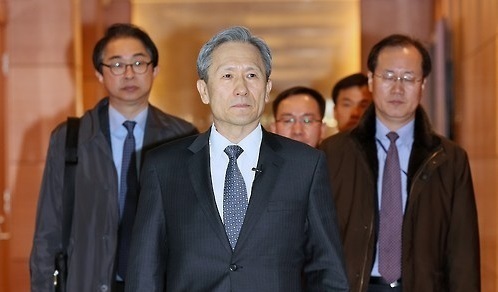Security chiefs of South Korea and the United States reaffirmed the initial agreement on a US advanced missile defense system that Washington would shoulder expenses for deploying and operating the weapon system, Seoul’s presidential office said Sunday.
The reassurance came amid growing jitters here over US President Donald Trump’s surprise remarks that South Korea should pay $1 billion for the Terminal High Altitude Area Defense system, some of whose key components have arrived on the peninsula.
 |
Kim Kwan-jin, head of the National Security Office (Yonhap) |
During a 35-minute phone call, US national security adviser Gen. H.R. McMaster told his counterpart Kim Kwan-jin that Trump’s remark was made in the context of the Americans’ demand that allies should be made to contribute more to the security alliance with Washington, Cheong Wa Dae said in a statement.
“(President Trump’s) remark was made in a general context that reflects the American citizens’ yearning for more burden-sharing from US allies,” McMaster was quoted as telling Kim during the call, which was made at the request of McMaster, according to Cheong Wa Dae.
Trump’s security adviser also praised the US alliance with South Korea as the “strongest alliance” and as Washington’s strategic priority in the Asian-Pacific region, saying that the US will be with South Korea “100 percent.”
In an interview with Reuters on Friday, Trump said he informed South Korea that “it is appropriate” for Seoul to pay for THAAD, describing it as “the most incredible weapon system.” He estimated the cost at $1 billion.
Despite strong pushback from the South Korean government, which claimed it had not been informed about such a request from Washington, Trump insisted the same idea in an interview with Washington Times.
Trump’s controversial THAAD remark has rattled the South Korean presidential election, with liberal parties calling for enhanced scrutiny over the platform’s deployment, which Seoul had agreed to with Washington in 2016 when former President Park Geun-hye was in power.
 |
The Democratic Party of Korea Sunday vowed to hold a parliamentary hearing in May. (Yonhap) |
The Democratic Party of Korea vowed to hold a parliamentary hearing in May to determine whether the Park administration met the legal requirements during the bilateral negotiation -- and if there was any secret agreement that justifies Trump’s demand for Seoul’s payment for THAAD.
“We will seek a hearing at the National Assembly in May in order to resolve public suspicion over the procedural legitimacy of the THAAD deployment and whether there was a secret agreement,” Democratic Party said at a press conference.
Seoul’s Defense Ministry and the US Forces in Korea were said to draft an agreement that mandates Washington to pay for deploying and operating THAAD. The Defense Ministry, however, has yet to reveal the document, saying it is classified.
According to the Status of Forces Agreement, South Korea is required only to provide the land and basic facilities for US military assets stationed on the peninsula. The cost for deploying and employing the assets, on the other hand, is to be borne by the US.
The centrist People’s Party also struck an assertive tone, saying that if the THAAD deployment creates “significant” financial burden on South Korean taxpayers, the measure should be subject to the parliamentary ratification process.
“Considering the fact that $1 billion is related to crucial national interest and is a massive financial burden, THAAD deployment should be left with us (lawmakers) for a parliamentary approval,” said Kim Geun-sik, the People’s Party’s spokesperson.
Meanwhile, violent clashes between the authorities and protesters continued at Seongju, North Gyeongsang Province, where the site for THAAD battery is located, since the US Forces in Korea surprisingly moved them in last week.
Earlier in the day, about 300 Seongju residents and protesters prevented two US vehicles carrying oil from entering the site. The vehicles had their access blocked and eventually headed back after a two-hour standoff, during which locals clashed with the police.
By Yeo Jun-suk (
jasonyeo@heraldcorp.com)









